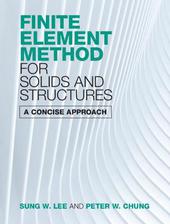
|
Finite Element Method for Solids and Structures: A Concise Approach
Hardback
Main Details
| Title |
Finite Element Method for Solids and Structures: A Concise Approach
|
| Authors and Contributors |
By (author) Sung W. Lee
|
|
By (author) Peter W. Chung
|
| Physical Properties |
| Format:Hardback | | Pages:366 | | Dimensions(mm): Height 252,Width 193 |
|
| Category/Genre | Technical design
Mechanical engineering and materials
Materials science |
|---|
| ISBN/Barcode |
9781108497091
|
| Classifications | Dewey:620.00151825 |
|---|
| Audience | | Tertiary Education (US: College) | | Professional & Vocational | |
|---|
| Illustrations |
Worked examples or Exercises
|
|
Publishing Details |
| Publisher |
Cambridge University Press
|
| Imprint |
Cambridge University Press
|
| Publication Date |
17 June 2021 |
| Publication Country |
United Kingdom
|
Description
This innovative approach to teaching the finite element method blends theoretical, textbook-based learning with practical application using online and video resources. This hybrid teaching package features computational software such as MATLAB (R), and tutorials presenting software applications such as PTC Creo Parametric, ANSYS APDL, ANSYS Workbench and SolidWorks, complete with detailed annotations and instructions so students can confidently develop hands-on experience. Suitable for senior undergraduate and graduate level classes, students will transition seamlessly between mathematical models and practical commercial software problems, empowering them to advance from basic differential equations to industry-standard modelling and analysis. Complete with over 120 end-of chapter problems and over 200 illustrations, this accessible reference will equip students with the tools they need to succeed in the workplace.
Author Biography
Prof. Sung W. Lee received his Ph.D. degree from the Massachusetts Institute of Technology. He is currently Professor of Aerospace Engineering at the University of Maryland where he taught courses on the finite element methods and carried out numerous sponsored researches on the finite element modeling of solids and structures. He had served on the editorial advisory boards of such international journals as Computational Mechanics, International Journal for Numerical Methods in Engineering, and Computer Modeling in Engineering and Sciences. He received a lifetime achievement award for his work on computational analysis of shell structures at the 2015 International Conference on Computational and Experimental Engineering and Sciences. Peter W. Chung's research has been concerned mainly with the computability of interdisciplinary and multiscale problems with applications motivated primarily by his early career experiences in the US Army Research Laboratory. He is currently Professor of Mechanical Engineering at the University of Maryland. Through his time in both government and academic sectors, Professor Chung has had the privilege of conducting research as well as participating in significant policy-shaping activities including service to the Materials Genome Initiative (MGI) and the Army Materiel Command Logistics Transformation Task Force. He is recipient of the Superior Civilian Service Award, the second highest civilian award in the Department of the Army.
Reviews'This book provides an excellent balance between the theoretical side, which is critical for students to understand essentials in the implementation procedure of the finite element method, and the application side in using commonly available finite element packages such as ANSYS. The examples illustrated in this book are particularly interesting, thorough, and easy to follow.' Qin Ma, Walla Walla University 'The perfect material for people who want to learn about or teach the theoretical background of the FEM. It explains key concepts with plenty of examples, MATLAB (R) codes and practice problems. The book also provides theories of element locking and mixed formulation, and detailed formulations for structural dynamics and heat transfer, showing how the FEM can be applied to various engineering problems.' Hoon Cheol Park, Konkuk University 'I strongly recommend this book to students who want to learn about the fundamentals of the finite element method. Professors Lee and Chung are well known for their contribution to the FEM field. The book focuses on the FEM using linear structural analysis, and Chapter 11 applies FEM to heat transfer problems, an excellent addition which opens the concept of FEM to solve partial differential equations.' Sameer Mulani, University of Alabama
|